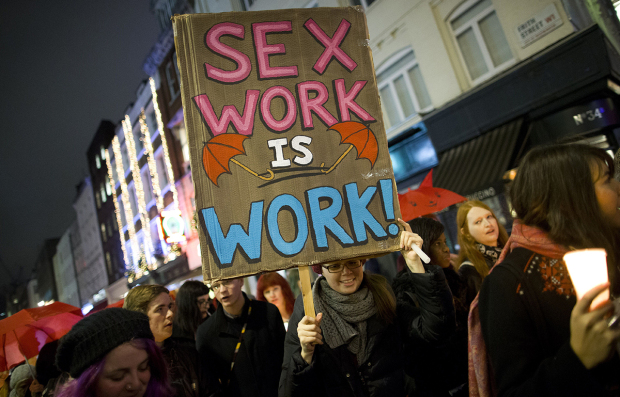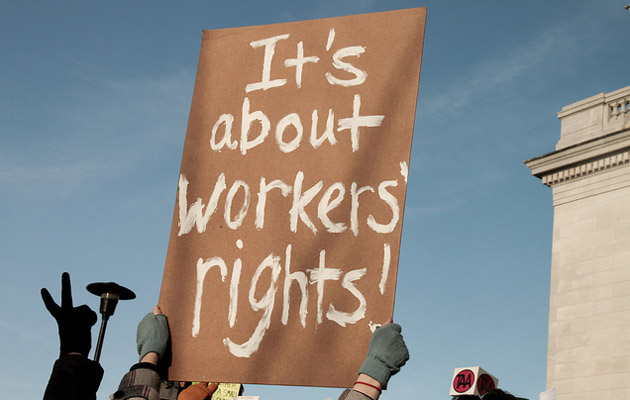
 How Backwards Prostitution Laws Are Failing Sex Workers In The UK
How Backwards Prostitution Laws Are Failing Sex Workers In The UK
The laws surrounding prostitution in the UK are failing to protect an estimated 100,000 prostitutes currently working in the sex industry.
The Crown Protection Service (CPS) website explains how the police are being asked to deal with prostitution.The CPS argues that 'prostitution is addressed as exploitation', and goes on to state that the police and CPS ‘recognise prostitution as a victim-centred crime’ and that both organisations ‘encourage (...) prostitutes to find routes out of prostitution.’
This kind of language further illustrates the view of the UK government, that sex workers are all victims and leaves no room for those who choose the career, while perpetuating dialogue which alienates sex workers from the rest of society.
These laws are inhibiting the rights of workers across the country and ideas like these work to socially and financially harm the people who choose to make a living from sex work.
This war on sex shares issues with the war on drugs – attempting a total ban breeds resistance and crime which is unable to be regulated. Laws against prostitution are not going to stop people buying sex, just like laws against drugs are not going to stop people buying drugs. It is safer to legitimise the profession; taking the power and money away from the people who benefit from the illegality, and protecting the vulnerable from unjust prosecution.

There is no denying that the sex industry itself is problematic in many ways. There is an inherent inequality in the exploitation of the female body for sex work. There are also very serious problems in terms of modern-day slavery, human trafficking, prejudices and the exploitation of the voiceless and vulnerable. But these problems can be considered separately from prostitution laws.
In reality, there are many sex workers of all genders currently working in the UK who have willingly chosen sex as a career and are being limited in a myriad of ways. Due to the dialogues and laws which imply that all prostitutes are vulnerable, trafficked or forced. These assumptions are what has given rise to the current laws in the UK.
The main issue then is that sex work is not recognised as a legitimate profession, resulting in the backward restrictions that sex workers are facing as they try to make a living.
The current laws state that:
‘A person commits an offence if (a) he intentionally causes or incites another person to become a prostitute in any part of the world, and (b) he does so for or in the expectation of gain for himself or a third person.’
‘A person commits an offence if (a) he intentionally controls any of the activities of another person relating to that person’s prostitution in any part of the world, and (a) he does so for or in the expectation of gain for himself or a third person.’
So what do these laws mean for workers?
Sex workers miss out on job security

The above illustrates that it is impossible for anyone to incite or control another in sex work. Managers, supervisors and employers are by definition inciting activity in and controlling their employees. This means that businesses can’t exist which employ prostitutes, and sex workers are unable to be involved in official employment.
What this translates to is that sex workers can only legally work for themselves, taking away the sense of job security or protection you can gain from working under a contract. It also means that sex workers are unable to advance their career through business expansion with other employees (in doing so providing opportunities for others in the industry).
No access to employment advantages

Because sex workers are unable to work under an employment contract, they are also unable to take advantage of benefits which are essential workers’ rights. Benefits of official employment include parental leave and sick leave, maternity leave when expecting a child, and bereavement leave when you have lost a loved one. These entitlements allow workers to be able to look after their families, protect their bodies and health when pregnant and mourn loved ones without fear for their financial wellbeing.
Another entitlement that we take for granted is holiday pay – a legal entitlement to breaks and paid stress relief periods that all employees require in order to perform their duties well. Emotionally and physically stressful occupations such as sex work, or in fact any work of a physical nature, especially require this kind of entitlement.
Sex workers also miss out on health screenings and health care that is often part of several jobs that risk the physical or mental health of the individual. Regular checkups ensure the workers are physically and mentally fit for the job, and could quickly identify any signs of stress, mental health deterioration or the beginnings of PTSD – a mental illness common among ex-sex workers.
Sex workers also miss out on protections that could be afforded by regulation of supervisors, managers or employers

By being engaged in formal employment, sex workers may be able to choose employers who will provide solutions to threats that many may be facing to their wellbeing in the workplace.
Under contracted employment, sex workers may be able to propose clauses which would allow them to agree to their own terms with each client. There would be better opportunities for protection in the workplace by way of more sexual health and safety screening of clients.
For example, there could be a better implementation of compulsory condom use. There may be potential for greater safety from abuse or assault by providing less personal information to clients, performing services away from the home and having safety and security methods in place.
Most importantly, sex workers could negotiate the right to refuse service – a luxury that a worker who is unprotected by a contract or manipulated by criminal association may be too scared to do.
Would have greater access to rehabilitation, legal help and health care services

Should sex work and the associated businesses be legitimised and legalised, sex workers would have more social freedom to access rehabilitation and health care services. They would be out of the hands of exclusively criminal individuals and the fear of conviction by the law would decrease.
Legalisation could mean that workers will feel more comfortable with seeking care and reporting abuse. The stigma against the police and government-run programmes will slowly fade and promote greater regulation.
Legitimising the work would help to legitimise the people

One of the biggest challenges that sex workers face is the prejudices held against them by the public. While the sex work industry continues to be stigmatised and misunderstood, prospective friends and partners, business contacts through secondary employment, neighbours and any other acquaintance can lawfully pass social judgement. While the government continues to limit the opportunities of sex workers, they are making permissible the alienation and discrimination of sex workers.
If sex was to be recognised as a legitimate business industry which protects its workers and removes power from those who may exploit, UK society would have one less hurdle in the road to accepting sex workers as contributors to society and economy.
